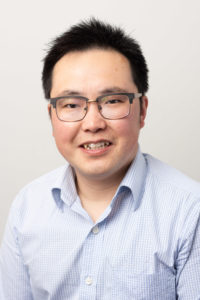 Li Gao is a Research Strategist at South East Water. He received MSc and Phd from Delft University of Technology (Netherlands) and Victoria University (Australia), respectively. His Phd study focused on the development of novel membrane process for desalination purpose. Since his PhD completion, Li has been working in the water utilities and coordinates the strategic research portfolio. His research interests include novel membrane process/material development, emerging contaminant removal, and nature-based water treatment. Li is also an Adjunct Senior Lecturer at Griffith University, Australia.
Li Gao is a Research Strategist at South East Water. He received MSc and Phd from Delft University of Technology (Netherlands) and Victoria University (Australia), respectively. His Phd study focused on the development of novel membrane process for desalination purpose. Since his PhD completion, Li has been working in the water utilities and coordinates the strategic research portfolio. His research interests include novel membrane process/material development, emerging contaminant removal, and nature-based water treatment. Li is also an Adjunct Senior Lecturer at Griffith University, Australia.
Read Li Gao’s Emerging Investigator article “Emerging investigator series: Effects of sediment particle size on the spatial distributions of contaminants and bacterial communities in the reservoir sediments” and read more about him in the interview below:
Your recent Emerging Investigator Series paper focuses on Effects of sediment particle size on the spatial distributions of contaminants and bacterial communities in the reservoir sediments. How has your research evolved from your first article to this most recent article?
My initial research starts from algae bloom and water quality. It grows organically to a broader area, including different contaminants (heavy metals, microplastics, PFAS, different microbial contaminants, etc.) in the raw water (rivers and reservoirs), various energy efficient treatment processes (membranes and AOP processes), and network management. I believe we should take a ‘whole-of-system’ approach to manage the entire urban water cycle.
What aspect of your work are you most excited about at the moment?
Now we are facing a different world with pressures from population growth, resource scarcity, and climate change. My research contributes to the transformation of water industry with the circular economy, helping us to build a more sustainable future.
In your opinion, what are the most important questions to be asked/answered in this field of research?
We find that it is unavoidable to implement the desilting in the reservoirs due to the accumulation of silts. The water quality in reservoirs can be affected significantly for an extended period of time, affecting the environments and water supply security. The key question here is to better understand the effects and develop solutions to manage the negative effects.
What do you find most challenging about your research?
Since I work as a researcher in a water utility, I find the most challenging thing is to transfer the excellent research outcomes into real industry benefits. A lot of studies focus on the fundamental research, which cannot be directly utilised in the industry. It is imperative to bring both sides together and bridge the gaps between research and industry needs.
In which upcoming conferences or events may our readers meet you?
I serve as the organising committee member for the 11th International Membrane Science & Technology Conference (5th – 8th Dec 2022 in Melbourne) and scientific committee member for the 13th International Water Association Specialist Conference on Wastewater Ponds and Algal Technologies (3rd – 6th July 2022 in Melbourne). I am looking forward to meeting peers face-to-face again after 2 years pause and delay due to the COVID-19.
How do you spend your spare time?
I have young kids, they always keep me busy 😊
Which profession would you choose if you were not a scientist?
I enjoy nice food and probably try to open a restaurant and become a Chef.
Can you share one piece of career-related advice or wisdom with other early career scientists?
I do not think I am qualified to provide advice to other early career researchers, but I would like to share the famous movie quote – ‘Life was like a box a chocolates. You never know what you’re gonna get’.










